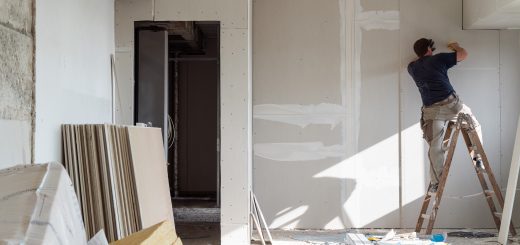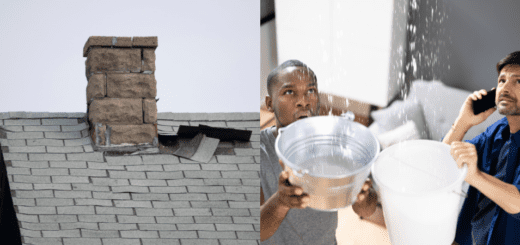Actions that Lead to Winter Damage in your Home
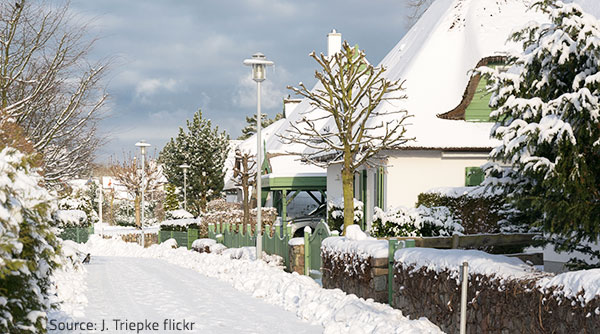
When winter turns the entire world into an enormous snow globe, life becomes different.
When covered under the thick blanket of snow, the whole world seems to change – the streets become quieter as traffic is considerably reduced, the front yards appear all the more cheerful and inviting with friendly snowmen greeting the passengers, the homes get even cozier and lovelier with brightly lit fireplaces and the scent of hot beverages brewing inside. Life is different in the winter, more charming and more challenging at the same time. It brings plenty of joy and cheer, but also poses great potential threats to your comfortable lifestyle. Unless you take proper precautionary measures and prepare your home well for the severe winter weather, heavy snow, freezing temperatures, and strong chilly winds can cause lots of troubles and considerable damage to your property. In fact, even your own casual actions may contribute to the damage, so you need to be much more careful and more prudent than usual.
Therefore, it’s highly recommendable to get familiar with the most common mistakes that may result in winter damage to your home and make every effort to avoid them and save yourself thousands of dollars in property restorationRestoration is the process of returning a property to its pr... More.
Allowing Ice and Snow to Build Up on Your Roof
Unless you remove the snow from your roof at every chance you’ve got, it will build up and become a considerable threat. Even if it doesn’t cause the roof to collapse, too much snow will most likely result in the formation of ice dams and cause water damage to your home. An ice dam occurs when heat from inside melts the snow on the roof and the draining water refreezes at the edge of the roof. The resulting ice wall prevents water from draining away. The trapped water can then easily leak into your home, causing considerable property damage.
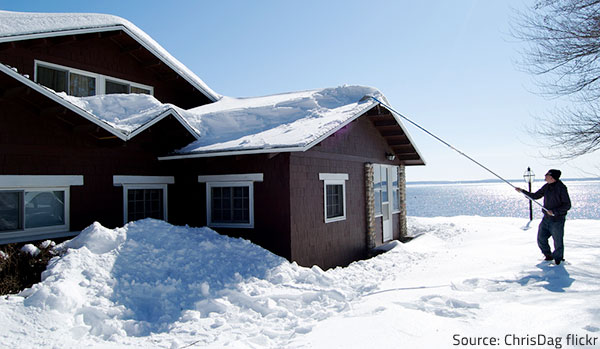
Too much snow on the roof poses considerable threats to your property.
To avoid snow damage, you are advised to:
- Use every chance to remove snow and ice from the roof;
- Keep the gutters clean and free of dead leaves and other debris, so that the water from melting snow and ice can freely flow away;
- Add quality attic insulationInsulation is a material used in buildings to reduce the tra... More to minimize the amount of heat getting to the roof (and causing the snow to melt);
- Make sure the attic is well ventilated to keep it cold, so that snow won’t melt easily.
Preventing ice dams, however, is not enough to avoid winter damage to your home. The most common problem during the cold months – water damage – may result from many different sources, such as frozen pipes, leaking windows, cracks in the masonryMasonry is the craft or construction of structures using mat... More, sewageSewage is wastewater containing biological and chemical cont... More backups, etc. So, you need to be aware of all the possible risks and find an efficient way to deal with them.
Forgetting about the Pipes
Frozen and burst pipes have proven to be the main culprit in most winter damage scenarios. When water freezes, it expands and exerts great pressure on the pipes, causing them to crack. Once the ice blockage melts, water starts spilling from the cracks and results in major damage. To prevent such troubles, you need to prevent the pipes from freezing in the first place:
- Make sure all the pipes in your property are well insulated and in good repairRepair is the act of fixing or restoring damaged property, m... More;
- When winter comes, disconnect exterior hoses from their faucets, shut off outside faucets, and drain any remaining water;

Frozen pipes may look like works of art but you need to thaw them promptly in order to prevent severe damage to your property.
- Keep your thermostatA thermostat is a device that monitors and regulates tempera... More set at about 60°F during the cold months;
- Allow warm air to circulate freely around the pipes in your home – keep cabinet doors in your kitchen and bathroom open, use fan heaters to direct warm air towards the pipes, etc.;
- Let any faucets connected to pipes that run through unheated areas drip all the time;
- Do not turn off the heat in your home while you are away.
When taking care of the pipes in your property, pay special attention to the ones located in outside walls, near cold air vents or concrete, or near crawlspaces, attics, or basements, as they are extremely vulnerable to freezing.
See also: How to react to frozen pipes
Allowing Water to Seep into Your Home
Water from melting ice and snow can easily make its way into your home unless you have taken proper precautions:
- Maintain the roof and the walls of your house in excellent condition – make sure roof shingles are securely fastened, replace broken tiles and secure loose ones, put a cap over the chimney, repairRepair is the act of fixing or restoring damaged property, m... More cracks or openings in the walls, insulate the windows, etc.;
- Ensure proper drainage – replace damaged or rusty drainpipes, remove any leaves and debris from the eaves troughs and downspouts, and add a length of downspout to direct water from your gutters away from the foundations of your home;
- Make sure the grading around your house slopes away from the foundations – rake mulch so that it slopes down and away from the house;
- Clear the catch basins nearby – keep drainage swales and catch basins free of debris so that water can flow off your property without obstructions;
- Keep window wells free of leaves and debris (so that water can drain away) and shovel out the snow (to make sure water won’t leak through the window when the snow starts to melt);
- Shovel snow away from foundation walls and basement windows.
Water damage, however, is not the only threat to your property during the winter. Here are some other potential risks you need to be careful about.
Improper Heating
Improper use or poor maintenanceMaintenance is the routine care, inspection, and repair of a... More of heating systems during the winter months can cause fire and/or smoke damage. Make sure you:
- Have chimneys and flues on fireplaces and stoves inspected and thoroughly cleaned at least once a year;
- Have furnaces and boilers serviced on a regular basis;
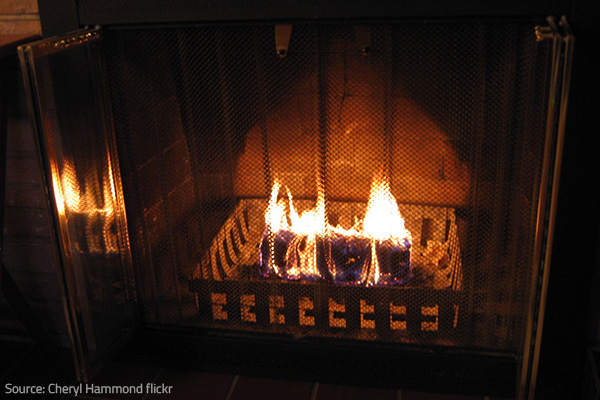
When winter comes, you need an efficient way to keep your home not only warm and cozy, but also safe.
- Burn only seasoned wood in your fireplace to reduce the risk of creosote buildup;
- Use fire screens to prevent flying embers from launching into the room and starting a fire;
- Safely dispose of ashes – place them in metal containers and take them out of the house immediately (never put ashes in or near the trash!);
- Ensure proper ventilationVentilation is the process of exchanging or circulating air ... More, especially if fuel-burning heaters are used in the premises;
- Keep electric space heaters on stable inflammable surfaces, away from combustible materials. Avoid using extension cords to power the units and be careful not to overload the electric circuits;
- Install fire alarms and smoke detectors throughout your home. Do not forget to test them regularly and supply fresh batteries when needed.
Not Taking Proper Care of Your Outdoor Area
To minimize winter damage, you need to take proper care of your yard, as well.
- TrimTrim is the decorative or functional molding used to finish ... More bushes and trees – make sure no branches obstruct the garden paths or spread too close to the house. Consider snow fences to prevent snow from drifting too much and blocking access to your home;
- Don’t use harsh de-icing products on your driveways or walks – some de-icing chemicals damage the cement that bonds concrete together, so you may end up ruining your driveways or walks while trying to thwart ice damage. Use traction sand instead – it won’t damage the concrete and will also be gentler on plants and pet’s paws;
- Avoid metal or metal-edged snow shovels – they can scratch the surface of your driveways and garden paths (especially if they are made from stamped concrete or colored concrete) or deposit metal filings that will rustRust is a reddish-brown oxide that forms on iron or steel du... More over time and mar the appearance of the concrete. Use wood and plastic snow shovels or rubber-tipped blades to avoid permanent damage to the walkways.
Not Taking Adequate Precautions
Winter damage to homes is usually covered by homeowners’ insurance policies as long as the property is properly maintained and adequate precautionary measures are taken to prevent the damage. Any damage due to supposed negligence will not be covered, so be careful to:
-
- Maintain your property well. As already mentioned, you need to keep your home in excellent condition and provide as much protection against the whims of the weather as possible – install storm windows and weather-strip doors, provide additional layers of insulationInsulation is a material used in buildings to reduce the tra... More wherever possible, install fire alarms, ensure good ventilationVentilation is the process of exchanging or circulating air ... More, etc.;
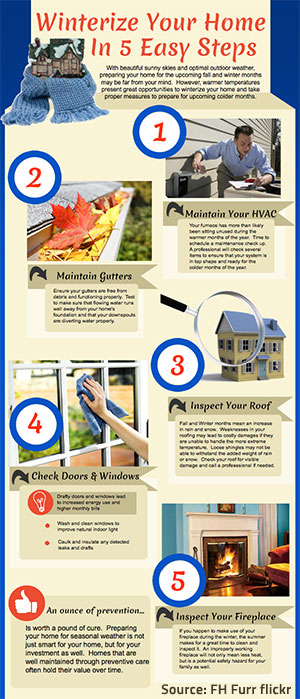
Winterproofing your home is your best bet against property damage.
- Choose an appropriate insurance plan for your home. Discuss your options with your insurance agent and decide on the most advantageous insurance plan in your specific case (you may or may not have coverage for mold remediation, restorationRestoration is the process of returning a property to its pr... More of water-damaged electronics or other household items, etc.);
- Plan for a winter storm. Electricity or gas supply may be cut off during a blizzard, roads may be blocked by heavy snow, and so on. Therefore, it is a good idea to have an alternative heat source (such as a fireplace or a coal stove, as well as sufficient fuel, of course) and to store some essentials that will allow you to survive for a week or so without deliveries (medicines, non-perishable food and bottled water, warm clothes and extra blankets, batteries and candles, etc.);
- Ensure free access to your home. Make sure your residence will be easily accessible in case of a fire, medical or other emergency, regardless of the weather (keep your driveway free of snow and ice, clear snow away from the nearest fire hydrant, etc.)
Winterizing your home the right way is your best bet against winter damage – take every precaution possible and steer clear of common housekeeping mistakes to prevent winter problems in your home. And yet, if inclement weather or a severe winter storm inflicts damage to your property, in spite of your efforts, call a reputable storm damage restoration company immediately, as any delay will only result in further damage. The experienced specialists will not only restore the good condition of your property, but will also help you with your insurance claims. So, you will be able to enjoy the warmth and coziness of your home throughout the rest of the winter, despite the unfortunate event.










